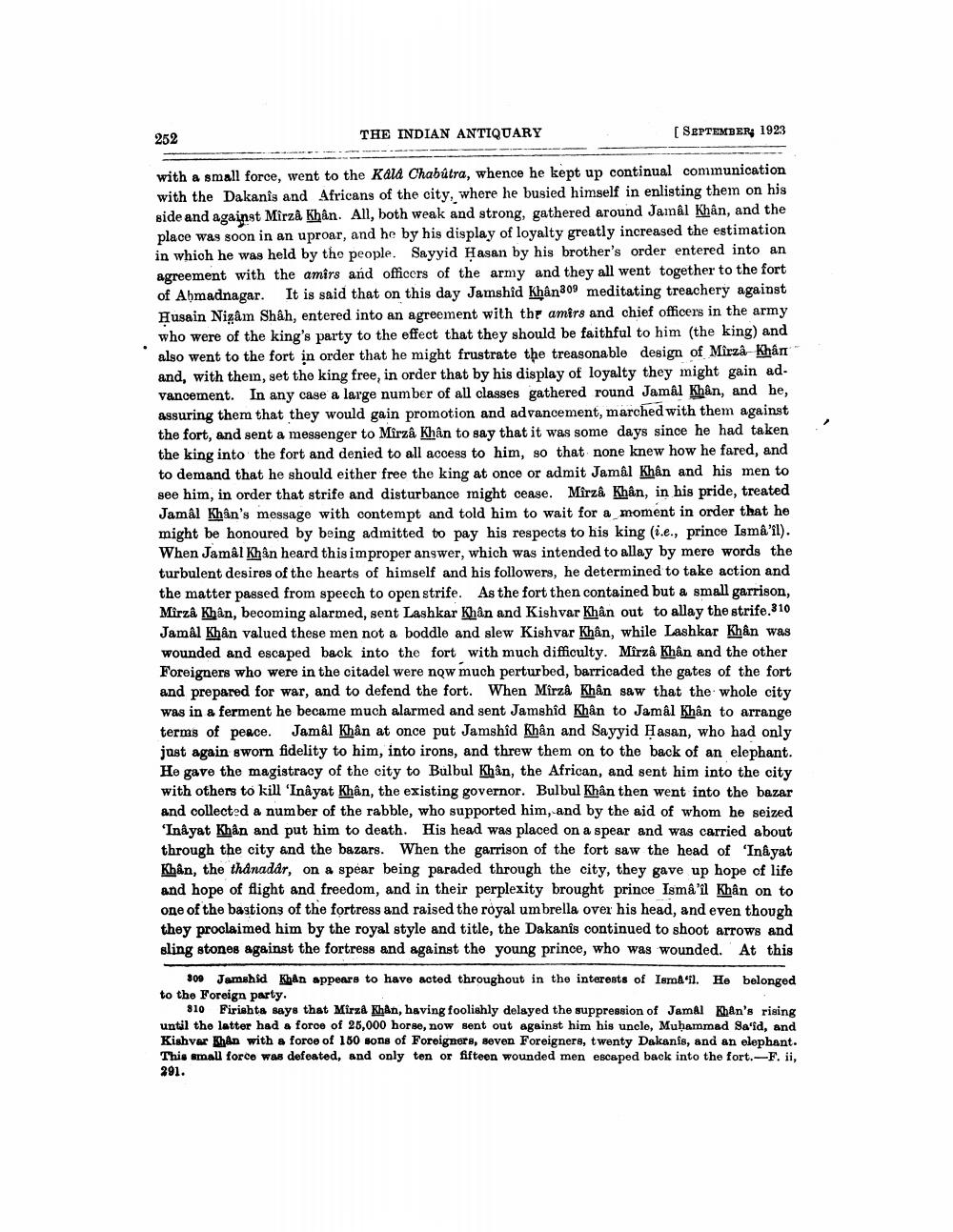________________
THE INDIAN ANTIQUARY
[ SEPTEMBER, 1923
252
with a small force, went to the Kaia Chabútra, whence he kept up continual communication with the Dakanis and Africans of the city, where he busied himself in enligting them on his side and against Mirza Khan. All, both weak and strong, gathered around Jamal Khân, and the place was soon in an uproar, and he by his display of loyalty greatly increased the estimation in which he was held by the people. Sayyid Hasan by his brother's order entered into an agreement with the amirs and officers of the army and they all went together to the fort of Ahmadnagar. It is said that on this day Jamshid Khân309 meditating treachery against Husain Nizam Shah, entered into an agreement with thr amirs and chief officers in the army who were of the king's party to the effect that they should be faithful to him (the king) and also went to the fort in order that he might frustrate the treasonable design of Mirzà khân and, with them, set the king free, in order that by his display of loyalty they might gain advancement. In any case a large number of all classes gathered round Jamal Khân, and he, assuring them that they would gain promotion and advancement, marched with them against the fort, and sent a messenger to Mirza Khân to say that it was some days since he had taken the king into the fort and denied to all access to him, so that none knew how he fared, and to demand that he should either free the king at once or admit Jamal Khan and his men to see him, in order that strife and disturbance might cease. Mîrza Khân, in his pride, treated Jamal Khan's message with contempt and told him to wait for a moment in order that he might be honoured by being admitted to pay his respects to his king (i.e., prince Isma'il). When Jamal Khan heard this improper answer, which was intended to allay by mere words the turbulent desires of the hearts of himself and his followers, he determined to take action and the matter passed from speech to open strife. As the fort then contained but a small garrison, Mirza Khan, becoming alarmed, sent Lashkar Khan and Kishvar Khân out to allay the strife 310 Jamal Khân valued these men not a boddle and slew Kishvar Khân, while Lashkar Khan was wounded and escaped back into the fort with much difficulty. Mirza Khan and the other Foreigners who were in the citadel were now much perturbed, barricaded the gates of the fort and prepared for war, and to defend the fort. When Mirzà Khân saw that the whole city was in a ferment he became much alarmed and sent Jamshid Khân to Jamal Khân to arrange terms of peace. Jamal Khan at once put Jamshid Khan and Sayyid Hasan, who had only just again sworn fidelity to him, into irons, and threw them on to the back of an elephant. He gave the magistracy of the city to Bulbul Khân, the African, and sent him into the city with others to kill 'Inayat Khân, the existing governor. Bulbul Khân then went into the bazar and collected a number of the rabble, who supported him, and by the aid of whom he seized 'Inayat Khan and put him to death. His head was placed on a spear and was carried about through the city and the bazars. When the garrison of the fort saw the head of 'Inayat Khân, the thanadár, on a spear being paraded through the city, they gave up hope of life and hope of flight and freedom, and in their perplexity brought prince Ismâ'il Khân on to one of the bastions of the fortress and raised the royal umbrella over his head, and even though they proclaimed him by the royal style and title, the Dakanis continued to shoot arrows and sling stones against the fortress and against the young prince, who was wounded. At this
300 Jamshid Khan appears to have acted throughout in the interests of Ismail. He belonged to the Foreign party.
810 Firishta says that Mirza Khan, having foolishly delayed the suppression of Jamal Khan's rising until the latter had a force of 25,000 horse, now sent out against him his uncle, Muhammad Sa'id, and Kishver Khan with a force of 150 sons of Foreigners, seven Foreigners, twenty Dakanis, and an elephant. This small force was defeated, and only ten or fifteen wounded men escaped back into the fort.-F. ii, 291.




